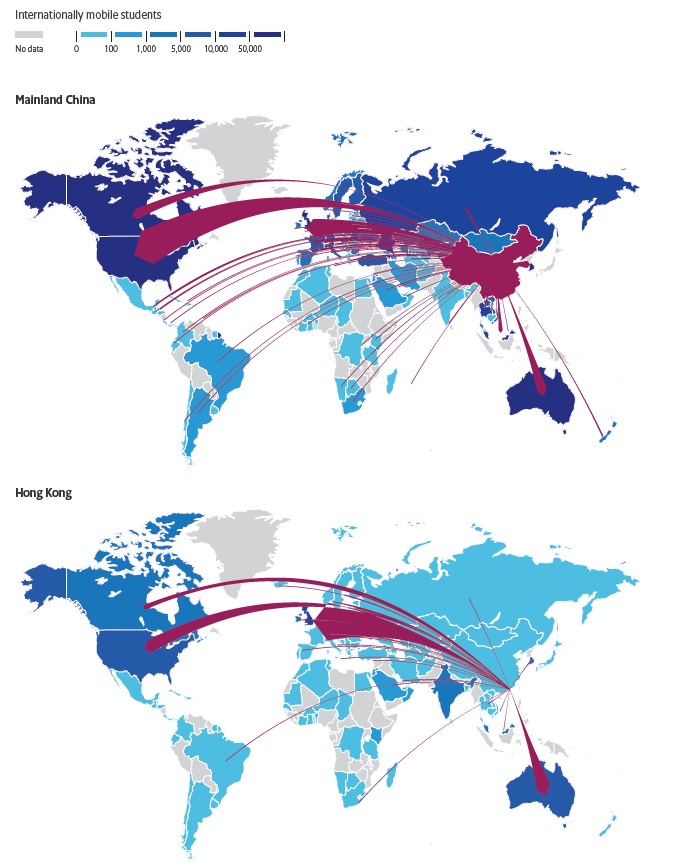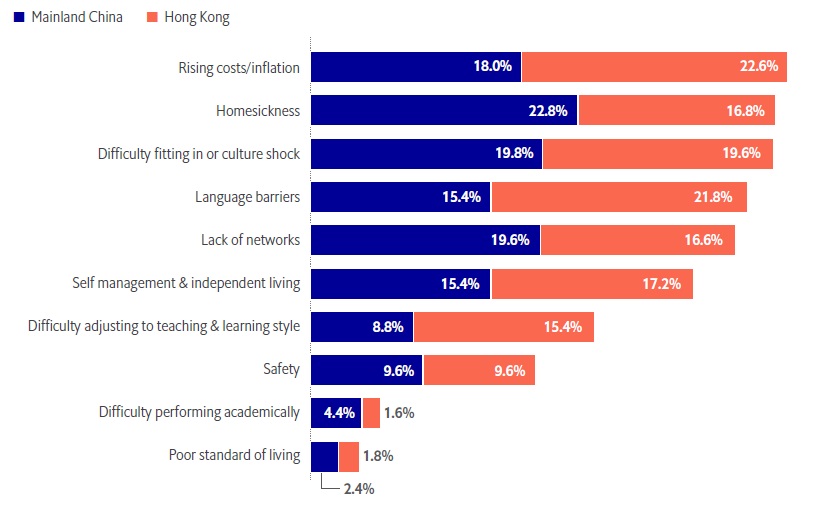Ready for anything: Preparing for overseas child education among mainland China and Hong Kong parents is a report from Economist Impact, supported by HSBC Life. It explores the expectations and realities of parents approaching overseas education for their children, and the challenges and opportunities this represents.
Between October and November 2023 Economist Impact surveyed 1,000 parents from high income households—500 each from mainland China and Hong Kong—to explore their perceptions and experiences of sending their children for education overseas. Half of the sample in each location (ie, 250 respondents) have children currently studying abroad, while the remaining half are planning on doing so. Nearly half of the parents in our survey have teenage children (45%), while 39% have children aged more than 20 years.
Figure 1: Majority of students opt to study in English-speaking Western countries
Global mobility of tertiary students from mainland China (top panel) and Hong Kong (bottom panel)

Source: UNESCO, 2021 and Economist Impact
Key research takeaways:
- Most parents in our sample (67%) plan to or have sent their children for tertiary education overseas, while a smaller proportion (28%) select secondary education. Parents from mainland China show a greater preference for pursuing primary (5% vs 4%) and secondary (32% vs 24%) education overseas than their Hong Kong counterparts. Those planning overseas study veer towards sending their children at younger ages compared with the group whose children are currently overseas. Similarly, those planning for overseas study were looking into a longer duration of study compared with those whose children are currently overseas.
- Four English-speaking countries—the US, the UK, Canada and Australia—are the most popular destinations among our survey population. When considering the top three choices, the US is most popular with mainland China, while the UK is favoured by Hong Kong parents. The UK is the most frequently attended location, representing a quarter of students who are currently abroad in our sample.
- Parents are increasingly considering regional locations for overseas education. Among those currently studying abroad, only 3% were placed in East or South-East Asian locations. Meanwhile, over 16% of parents planning to send their children overseas are selecting East or South-East Asian economies as their first choice. Japan and Singapore are by far the most popular Asian locations. Crossborder education between Hong Kong and the mainland is also increasingly popular.
- Subtle differences in motivations are also seen. Those from the mainland more often rank improved employment opportunities abroad as their top reason for considering overseas education compared with Hong Kong parents (22% vs 10%). Hong Kong parents are more likely to rate institutional prestige (19% vs 14%) and academic performance (18% vs 13%) as their primary reason for pursuing overseas education when compared with their mainland China counterparts.
- Among non-academic skills that parents hope their child will gain from overseas education, independence/self-management and personal development/adaptability/flexibility are the most frequently selected (by over 60% of respondents). This is followed by critical thinking (47%) and creativity (43%). Overall, 78% of parents in our survey with children currently studying overseas reported that their child had acquired more additional skills than they had expected.
- More than 88% of parents in our survey report being informed or very well informed about the costs associated with overseas education. However, the continued impacts of inflation and rising cost of living are affecting the cost of overseas education. More than 58% of parents with children currently overseas report that the costs are higher than anticipated. As such, rising costs and inflation is the most frequently reported challenge faced, cited by 41%. When asked to rank the reasons for the gaps between the expected and actual costs of overseas education, changes to the cost of accommodation and living expenses are most frequently cited.
- Beyond the economic challenges of overseas education, the most frequently cited challenges focus on the social and emotional impacts of pursuing education overseas. Homesickness and difficulty fitting in or culture shock are both reported by about 40% of survey respondents. Language barrier was the next most frequently reported challenge (37%).
- Most survey respondents (60%) report planning for overseas education when their child was in secondary school. Many report late planning: 39% pursuing overseas primary education only started planning when their child was already in primary school. Similarly 52% pursuing secondary education began planning while their child was in secondary education.
- Earlier and more comprehensive preparation for overseas education can help mitigate some of the challenges identified in our survey. While parents should consider how they will financially support their child’s education, they should also place importance on the non-academic soft skills necessary for children to get the most out of their overseas study experience.
Figure 2: Homesickness and difficulty fitting in are the leading non-economic challenges faced
Reported challenges faced by children during overseas education

Source: Economist Impact survey 2023
Read the report to learn more about how parents in mainland China and Hong Kong are preparing for their children’s education overseas.





